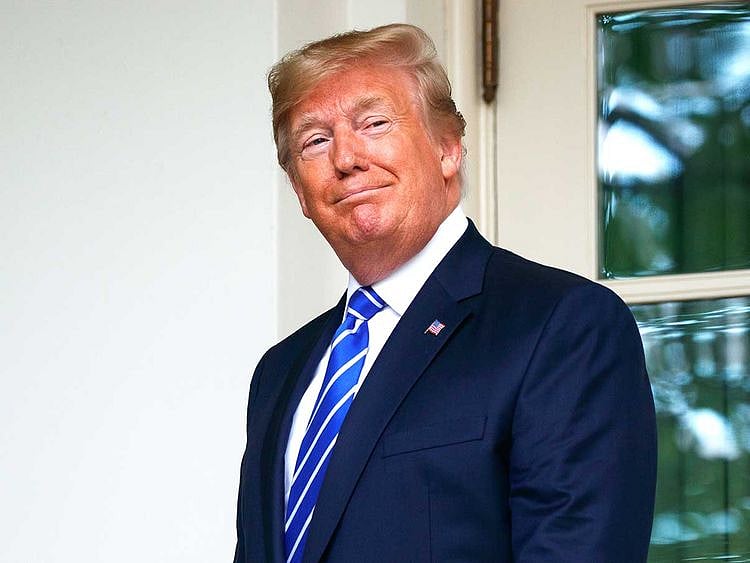Robert Mueller’s terse and sometimes halting congressional testimony, conventional wisdom quickly congealed: Mueller’s performance had made Donald Trump’s impeachment far less likely. “Robert S. Mueller III’s disastrous testimony has taken the wind out of the sails of the Democratic impeachment drive,” wrote Marc Thiessen in The Washington Post. CNN’s Chris Cillizza declared Mueller’s testimony “a bust — at least when it came to generating momentum for impeachment”.
Less than a week later, it’s clear that these hot takes were wrong. At no point in Trump’s wretched rule has impeachment appeared more probable. Indeed, Democrats on the House Judiciary Committee, which would oversee impeachment hearings, argue that an inquiry into impeachment has already begun. An inexorable confrontation between the House and the president has been set in motion.
Before Mueller’s testimony last Wednesday, 93 House Democrats had come out for an impeachment inquiry. As I write this Monday, the number is up to 109; among them are Reps. Katherine Clark, vice-chairwoman of the House Democratic caucus, and Mike Levin, a freshman from a swing district. By the end of the week, more than half the Democratic caucus could be on board.
Also Read
Trump erupts in fury as impeachment talk heats upDebate on Trump’s impeachment picks up steam2020 hopefuls push for impeachmentMueller’s presentation may have been underwhelming, but he allowed Democrats to put a bow around his findings, clearing away some of the deliberate confusion created by Attorney General William Barr’s misleading summary. “The press focused on the performance and the optics instead of on the substance,” said Representative Jerry Nadler, chairman of the Judiciary Committee. “Mueller said we were attacked by the Russians, the Trump campaign cooperated in many ways with that attack, they welcomed it, in many ways they worked with it.”
Democrats already knew all this, of course. But just as Trump’s recent racist outbursts forced renewed attention to his bigotry, Mueller made Congress squarely confront the president’s lawlessness and disloyalty to the country he purports to lead. Once he testified, congressional Democrats could no longer punt on the impeachment question by saying that they were waiting to hear from him.
And even if Mueller’s appearance didn’t change many minds, it galvanised some voters. Representative Dina Titus (Democrat, from Nevada), told me that in recent days, “The constituent calls that I have been getting have just increased, both in number and intensity, saying: ‘Enough is enough. It’s time for him to go.’” On Monday, she came out for beginning an impeachment inquiry.
Perhaps even more significant than the growing number of calls for impeachment is a lawsuit filed by the Judiciary Committee last Friday. The filing, demanding access to grand jury material from the Mueller investigation, says that the committee “is conducting an investigation to determine whether to recommend articles of impeachment”. In other words, the Judiciary Committee, which would oversee any potential impeachment, announced, with surprisingly little fanfare, that an impeachment inquiry is already underway.
For months now, there’s been an acrimonious intra-Democratic debate about whether House Speaker Nancy Pelosi should call a vote to begin such an inquiry. Now, however, the Judiciary Committee is asserting that such a vote isn’t required, and as Nadler points out, Pelosi has signed off on the strategy. The House would have to vote on impeachment itself, but that would come only after the Judiciary Committee has done much of its work.
“The Constitution does not delineate what a formal impeachment inquiry is, and the House rules don’t define what a formal impeachment inquiry is,” said Jamie Raskin, a Democrat on the Judiciary Committee who was a professor of constitutional law. “We all looked up after Robert Mueller’s testimony and realised that we are in an impeachment inquiry. What is this if not an investigation into high crimes and misdemeanours? That’s obviously what we’re doing.”
This may seem a little too cute — it allows Democrats to satisfy their base’s demand that Trump be held accountable without forcing representatives from conservative districts to take a potentially perilous vote. “I just have a feeling that you’ve either got to do it or not; you can’t have it both ways,” said Titus.
But Nadler argues that the Judiciary Committee started its impeachment inquiry into Richard Nixon before the full House voted to approve it. Impeachment proceedings for federal judges have begun in the Judiciary Committee without a House vote.
Whatever you want to call it, Nadler is hoping that Mueller’s appearance is just the first in a series of high-profile hearings. Soon his committee will go to court to enforce a subpoena of Donald McGahn, the former White House counsel. If the Democrats prevail, Nadler argues it will clear the way for them to compel other former White House staffers like Hope Hicks to testify.
So Mueller’s recent testimony wasn’t the end of the investigation into Trump. It was only the end of that investigation’s first phase. Now Phase 2 begins. “The numbers will continue to grow,” Raskin said of Democrats joining the call for impeachment. “The hardest place to be in politics is on the fence. And these members who are coming off the fence and calling me, tell me that they feel a great sense of relief.”
The first step in solving a crisis of democratic governance is admitting you have one.
— New York Times News Service
Michelle Goldberg is an Op-Ed columnist, who writes on politics and ideology.
Sign up for the Daily Briefing
Get the latest news and updates straight to your inbox
Network Links
GN StoreDownload our app
© Al Nisr Publishing LLC 2026. All rights reserved.
